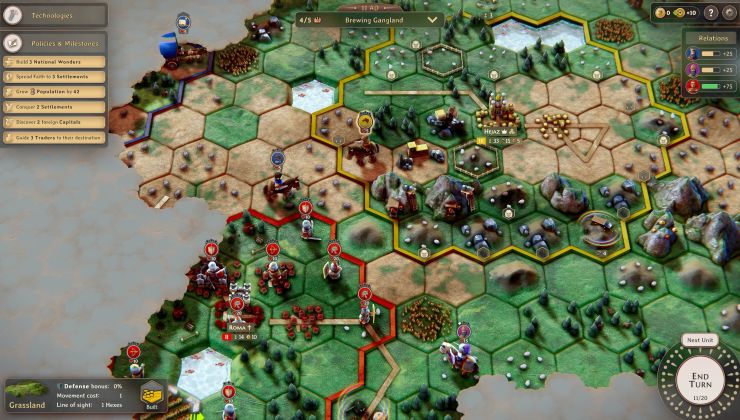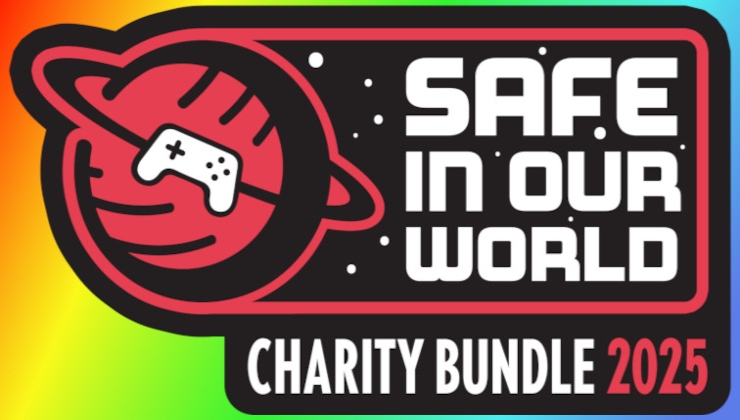Valve have put out a news post to highlight some of the top games put onto Steam in May and it's another reminder of why Steam Play is needed.
In this blog post they start by listing 20 games that had the top revenue earned in the first two weeks following their release. Without looking, take a guess at the number of games in that list that actually support Linux.
Did you take a guess? The answer is a rather sobering two: Rise of Industry and Total War: THREE KINGDOMS. What happens to that number if we include those that can be run with Steam Play, with a "Platinum" rating from user reports on ProtonDB? That brings it right up to nine, which is far more impressive. It would be even higher, if Easy Anti-Cheat and BattlEye worked with Steam Play and since both said they're working on it (Sources: EAC - BattlEye), things can only get better.
They also went over the top five free games, measured by peak player count within the first two weeks following release: Conqueror's Blade, Splitgate: Arena Warfare, Minion Masters, Eden Rising and Never Split the Party. Of those, only one supports Linux which is Never Split the Party. If we take "Platinum" Steam Play games again, that only rises to two.
Note: The top free games list has two entries that also appear in the top revenue list.
Without popular games, Linux gaming won't grow to a point where it will be noticeable. Once again, this is a big reason why Steam Play is going to help in the long run. First we get games, then we get players, then we hopefully get developers wanting control with their own supported Linux builds.
What's interesting though, is this only takes into account the first two weeks in both cases. Taking a look myself a bit closer, out of the top 20 games most played on Steam right now (players online) only one of those games Valve listed in the blog post actually make it at all, which is Total War: THREE KINGDOMS and that does support Linux. Going even further, out of the top 100 games on Steam for player count, from Valve's list, only currently Total War: THREE KINGDOMS shows up.
As a quick additional and interesting measure for June: Looking at the top 20 by player count right now, how many in total support Linux? A much healthier 10, so half which isn't so bad. Stretching it out even more, from the top 100 by player count, 43 of them support Linux.
So while we don't get the "latest and greatest" games, keep in mind that we do have a lot of games that stay popular supported on Linux, so there's at least a silver lining of sorts there.
It's not a correct analogy. Releasing for Linux is expanding your audience. That wouldn't stop you from continuing releasing for Windows users.
... But it forces you to spend time on the new market, at the expense of the old. Time is not an infinite resource. As any developer can confirm. That's the entire point of the analogy.
But we're running in circles now.
Last edited by Beamboom on 4 Jul 2019 at 9:02 am UTC
"Do you want/need more money or do you want more people to experience your work?"
One point to decide might be:
"Do you want/need more money or do you want more people to experience your work?"
That implies that there's no more people to reach out to in your current market, or that those are harder to reach than the new market. This is not the case here.
You need to be especially motivated to reach those particular people, give priority to them over the others, at the expence of the added cost. You choose some people over others.
Let's agree on at least one thing: Windows gamers are no less worth than Linux gamers. We are all gamers. We just sit on different platforms. And any artist, regardless of ability, want to reach an as large audience as possible. That's a fundamental drive for any creative soul.
Those that support Linux today, do that because they have a particular fondness for our platform. Very likely because they got developers who are Linux fans.
Or, evidently in some cases, they assume it doesn't cost them anything extra to just check the "linux" box when compiling out of Unity. And we all know how successful that's been at times...
You need to be especially motivated to reach those particular people, give priority to them over the others, at the expence of the added cost. You choose some people over others.
Except Windows users will have access to it no matter what. So it's not about reaching Linux vs reaching more Windows users. It's reaching Linux users vs not reaching Linux users.
Last edited by Shmerl on 4 Jul 2019 at 9:35 am UTC
If you're a game developer, you have a certain number of employees, you pay them by the hour or by a salary, either way you're paying for their time. If they work 8 hours in a day, what do you tell them to do with their 8 hours? 8 hours working on content for the Windows market, or 8 hours working on content for the Linux market? Spend their time working on a Windows game that 96% of the PC market can buy, or tell them to develop a Linux game that 0.8% of the PC market can buy?
Thankfully games don't have to be developed from scratch when they're ported, it's not like the art assets or voice acting that needs to be redone. But there is a certain cost associated with porting to Linux, a certain amount of work. Linux becomes economical, when the time spent on Linux vs the return from spending that time on Linux, is greater than more time spent working on content or games for Windows. Frequently that is not the case.
On that grounds, we are not going to get publishers like Ubisoft, EA, Activision, etc, even touching Linux until it reaches more like 20% of the market. But we're not going to get to 20% if we don't have their games.
It's the ancient catch 22 of Linux, need users to get support, need support to get users. This is why we need Proton. Proton is a form of support, the support just comes from Valve instead of the developers/publishers. If Valve hold steady and play the long game with Proton, eventually it will bring users as well.
Except Windows users will have access to it no matter what.
:D tell that to the developers. That it's just to release something on a market and the users will be there. "Make it and it will sell". It's not just a question of access.
To penetrate a market - regardless of industry - is a lot of work.
The sad reality is that nothing sells itself. The finished product itself is only one step in the process. You need to work constantly to keep that product visible on that market.
One needs to maintain a momentum on your product(s). And that's not just a question of marketing. One very common way to keep a product visible in the gaming industry is, as we know, via DLC. It doesn't just sell DLCs, it sells the GAME too. More people hear about it (or are reminded about it), read about your latest expansion, you (hopefully) achieve press coverage and they think "ah that game, that's right! Is that still alive? Ok I'll jump on it now".
Another common way is to add patches with new content. Fix issues. Tweak features based on feedback. And so on. To make people talk about it. Maintain the momentum. Keep the pressure up.
But all these efforts takes time. And time is - like it or not - money. There's expenses associated with every single working hour. And you only have a limited amount of hours at you disposal, regardless of your artistic ambitions. So make those hours count!
I almost feel bad for breaking this to you guys, please don't shoot the messenger here. But the (lack of) support we experience has a very very natural, logical explanation.
Last edited by Beamboom on 4 Jul 2019 at 1:57 pm UTC
How to get more linux out there? I'm honestly not sure we can. Macs come with macOS. And nearly all other sold computers come with windows, because microsoft have OEM deals with the computer manfucturers. What exact distro of linux can promise the same customer support deals that microsoft can? I can't think of a single one. And don't say Ubuntu. Sure, they're the most MS of the distros, but you still need a bunch of extra PPAs to really enjoy the variety of stuff out there, and then we're back at the subject of learning curves, knowledge levels and all sorts of things that really isn't selling it to the computer manufacturers.
Linux is awesome, and beats the alternatives by miles. But the day where a solid portion of sold computers come with a good distro pre-installed? I don't see that happening anytime soon.
And if that's not happening, then native linux games will continue being low, no matter how much we "demand" or how loud we are out in the various forums and message boards. All that does is to make us all appear rather troublesome and not worth the hassle. Demanding games to have native linux versions is just firing at the completely wrong target. It starts and ends with the linux marketshare on new computers.
And thus Wine and Proton and tools like Steam Play and Lutris helping us run windows games on linux really is our best bet. Not the best bet to get more people to use linux, because that's not really something we can do anything about, at least not to the degree needed for large gaming companies to ever consider us a viable alternative. But the best bet for ourselves to get to play the games. At all.
So this whole "Steam Play is hurting linux gaming" discussion is to me just so far off the point. I guess some of us are living in an echo chamber. Just because we continously are talking to other linux users and linux gamers, doesn't mean we're anything else than a tiny, tiny minority. But luckily a minority with a bunch of kickass developers and individuals in, bringing amazing tools like Wine and DXVK to us! :)
Steam Play is making gaming better for linux users. That's the truth. That's what matters.
Is it also greedy for a local book store to not open branches in other towns instead of expanding their current one to offer more variety to their current customers? That would be excluding every human being who doesn't live in the vicinity of their store, for more profits (because opening a brand new branch is much more costly than renting/building extra space).No - it's a very good analogy. You're already catering for one market.
It's not a correct analogy. Releasing for Linux is expanding your audience. That wouldn't stop you from continuing releasing for Windows users. Releasing for Windows users more instead, means excluding Linux users, for more profits. That's greed.
What about a bakery that starts making more croissants because they can't keep up with demand, and chooses not to make buckwheat bread for that one customer who comes by occasionally to ask if they have any? Is it really that unfair for them not to incur additional costs (in time, ingredients, maybe some training) just because they know there are some people who would buy some of that product?
In both examples, you choose to keep serving the same customers with more products because you already know you have a sustainable customer base and the means to provide the product they want. You could make the effort to expand laterally, but it would be more effort, more investment, and for some a tangible risk of failure.
Except Windows users will have access to it no matter what.
Nope. Sometimes a significant percentage of Windows users are excluded due to bad drivers, weak hardware (think of all Intel embedded graphics users) or some third party software they installed that doesn't work well with your game. Windows PCs are not a console platform, no game works out of the box on 100% of Windows computers because people don't upgrade their drivers since 2015, people customize their system to run some fancy tools like Rainmeter and then have problems due to this (see e.g. https://forum.rainmeter.net/viewtopic.php?t=28334 ) etc etc.
Think about that. You, as a developer, are facing the choice: spend your next month solving problems that unblock additional 10 thousand of your userbase on Windows (by e.g. trying to find workarounds for driver problems or solving that Rainmeter issue, or optimizing your game to run on poorer hardware), or spend your next month adding a thousand or so potential Linux users (whose setups are going to be probably even more diverse and come with worse problems than Rainmeter).
Also, I think your political analogy is wrong. A lot of Windows users with bad hardware are poor, whereas Linux gamers can be rich enough to afford beefy PCs and good graphics cards. So if you're thinking along the political lines, think who you're going to exclude in the above scenario - some poor kids playing on their mom's Intel laptop from work running Windows, or some rich 20-something who built himself a Linux PC and wants to play your game.
My point is: don't judge the people. Monopolies are bad, I agree, but people using monopolistic products - both users and developers - are not bad themselves.
But while we're in this one, it's hard to blame people for operating within it.
Last edited by Purple Library Guy on 4 Jul 2019 at 7:20 pm UTC
Think about that. You, as a developer, are facing the choice: spend your next month solving problems that unblock additional 10 thousand of your userbase on Windows (by e.g. trying to find workarounds for driver problems or solving that Rainmeter issue, or optimizing your game to run on poorer hardware), or spend your next month adding a thousand or so potential Linux users (whose setups are going to be probably even more diverse and come with worse problems than Rainmeter).
Also, I think your political analogy is wrong. A lot of Windows users with bad hardware are poor, whereas Linux gamers can be rich enough to afford beefy PCs and good graphics cards. So if you're thinking along the political lines, think who you're going to exclude in the above scenario - some poor kids playing on their mom's Intel laptop from work running Windows, or some rich 20-something who built himself a Linux PC and wants to play your game.
My point is: don't judge the people. Monopolies are bad, I agree, but people using monopolistic products - both users and developers - are not bad themselves.
I wouldn't make any assumptions about Windows vs Linux users in regards to what they can afford. If anything, Windows users need to spend more money due to paying Windows tax that goes to MS. So if someone really needs to save, they'd rather use Linux, which will slash down their PC price by around a $100.
And my point was about developers reducing choice. I.e. those who aren't releasing for Linux are simply preventing Linux users from accessing their work. You can't compare that to "we didn't spend enough on making Windows version better". The former is simply nothing at all. And while developers can't be directly blamed for perpetuating such lock-in, they are helping MS cement it, so they can't claim they aren't part of the problem.
That's why tools like Wine, Proton and etc. are good, they help break the lock-in and remove that lack of choice that developers imposed on users.
Last edited by Shmerl on 4 Jul 2019 at 7:46 pm UTC
Earthfall was working Out of The box, ready for to be whitelisted, but after the last game update, it doesn't work anymore due to some UE4 fatal error.. The game just crash.
Obviously, I will not get support from the game devs, so the solution (if it is any) must come from Proton Devs.
I think the only Steamplay games supported by Valve are the games in the white list.
I just experienced the bad side of SteamPlay:
Earthfall was working Out of The box, ready for to be whitelisted, but after the last game update, it doesn't work anymore due to some UE4 fatal error.. The game just crash.
That's a common pattern for Wine gaming and it's been like that forever. Game updates break stuff completely. Wine catches up after a while, then things repeat. That's why it's a lot easier to play games in Wine that don't get any updates anymore. Rapidly updated games are a lot more fragile, when developers don't care to test them in Wine themselves.
Last edited by Shmerl on 10 Jul 2019 at 5:09 am UTC
Considering that support cost is usually cited as the main reason against a Linux build those are important, and as far as I know, unanswered questions.
Go to your Steam Library
Right Click on Earthfall
Click "Properties"
Select "Betas" tab
Choose from the drop down menu: "classic - last UE 4.16 build"
"Close" and wait for the game to install










 How to set, change and reset your SteamOS / Steam Deck desktop sudo password
How to set, change and reset your SteamOS / Steam Deck desktop sudo password How to set up Decky Loader on Steam Deck / SteamOS for easy plugins
How to set up Decky Loader on Steam Deck / SteamOS for easy plugins
See more from me